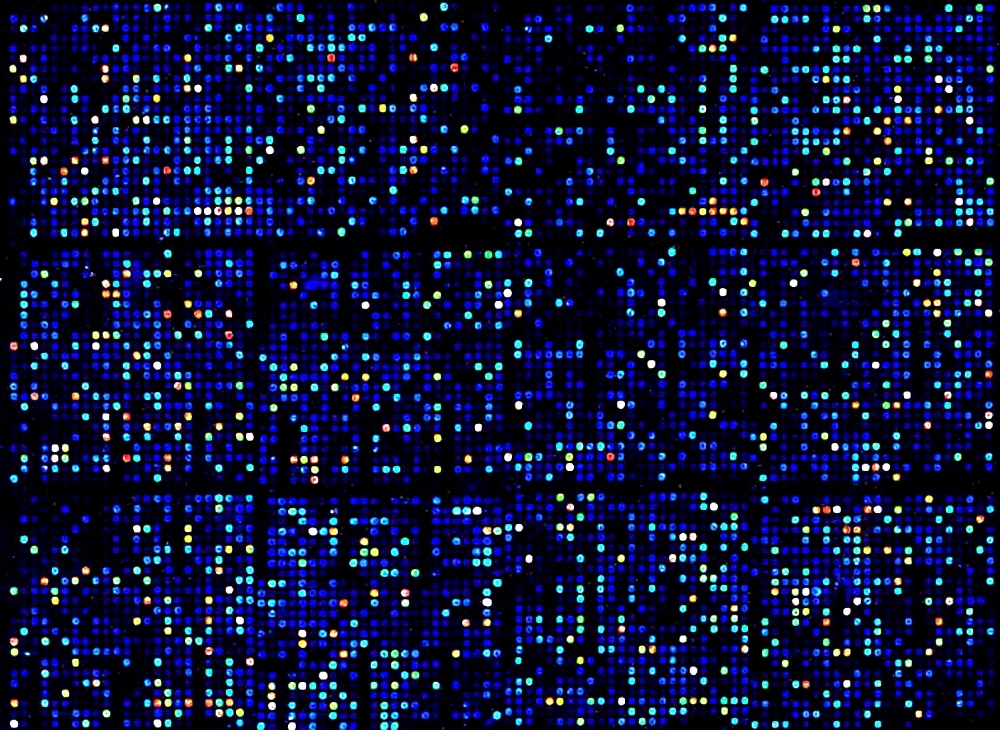aRNA Synthesis Kits
Data Sheet
![]() Shop this product in our online store
Shop this product in our online store
Arrayit | Amplified RNA aRNA DNA RNA microarray amplification labeling kits life sciences research
Reagents - Microarray Labeling - aRNA Synthesis Kits for DNA Microarrays Applications in Gene Expression Profiling, SNP Analysis and Genomics

For amplification of RNA for microarray, splice variant microarrays and other down stream applications where high quality aRNA is required.
This kit is optimized to use 50 ng-1 µg of total cellular RNA as starting material. The process includes the following steps:
- First Strand cDNA Synthesis
- Second Strand cDNA Synthesis
- Amplification of ds cDNA
- Purification of ds cDNA
- In Vitro Transcription with T7 RNA Polymerase featuring T7 Booster, a proprietary blend of enhancers to augment the polymerase activity resulting in an increase in both the yield and the amount of full-length transcripts. Special proteins are added into this enhancer mix that protects the nascent RNA strand during synthesis.
- RNA Purification
If used properly this kit will generate 5-250 µg of amplified anti-sense mRNA (aRNA) ready for labeling.
Table of Contents
- Introduction
- Quality Control
- Product Advantages
- Technical Assistance
- Requirements
- Short Protocol
- Complete Protocol
- Ordering Information
- Warranty
Introduction
Congratulations on taking a big step towards improving the economies of scale, quality and speed of your genomics research. This booklet contains a complete set of protocols outlining the steps and principles needed to use ArrayIt® aRNA Synthesis kit.
Quality Control
TeleChem assures the performance of this product. The finest scientific research went into the development of this product. Rigorous quality control monitoring on a lot-by-lot basis guarantees that the ingredients conform to the highest industry standards.
Product Advantages
- The most comprehensive kit available
- Robust RT reaction; allows full length cDNA synthesis with unique primers
- Unique second strand synthesis: takes the advantage of both linear and exponential amplifications
- Purification using unique columns that minimize loss
- Optimized reactions with unique additives, resulting in a huge incremental yield
Contents
Item |
Packaging |
Storage |
Enzyme Mix 1 |
16.5 µl in 0.5 ml tube |
-20°C Freezer |
Enhancer solution |
50 µl in 0.5 ml tube |
-20°C Freezer |
Reaction buffer 1 |
50 µl in 0.5 ml tube |
-20°C Freezer |
dNTP Mix |
22 µl in 0.5 ml tube |
-20°C Freezer |
DTT |
50 µl in 0.5 ml tube |
-20°C Freezer |
Primer 1AS |
11 µl in 0.5 ml tube |
-20°C Freezer |
Primer 2AS |
11 µl in 0.5 ml tube |
-20°C Freezer |
Primer 3AS |
22 µl in 0.5 ml tube |
-20°C Freezer |
Primer 4AS |
11 µl in 0.5 ml tube |
-20°C Freezer |
Enzyme Mix 2 |
11 µl in 0.5 ml tube |
-20°C Freezer |
Reaction Buffer 2 |
150 µl in 0.5 ml tube |
-20°C Freezer |
DNA Binding Buffer |
1.1 ml in 2 ml tube |
Room Temperature |
DNA Wash Buffer Concentrate |
0.5 ml in 8 ml bottle |
Room Temperature |
DNA Micro Column (without cap) |
10 each |
Room Temperature |
Elution Tube (1.5 ml) |
10 each |
Room Temperature |
2 ml Wash Tube |
10 each |
Room Temperature |
Nuclease Free Water |
1.5 ml in 2 ml tube |
-20°C Freezer |
Enzyme Mix 3 |
22 µl in 0.5 ml tube |
-20°C Freezer |
NTP Mix |
79.2 µl in 0.5 ml tube |
-20°C Freezer |
Reaction Buffer 3 |
22 µl in 0.5 ml tube |
-20°C Freezer |
DNAse |
11 µl in 0.5 ml tube |
-20°C Freezer |
Sodium Acetate Solution |
50 µl in 0.5 ml tube |
-20°C Freezer |
Linear Acrylamide |
11 µl in 0.5 ml tube |
-20°C Freezer |
Technical Assistance
Please contact us if you have any comments, suggestions, or if you need technical assistance. By electronic mail: arrayit@arrayit.com (under the subject heading please type ArrayIt technical assistance). By email: arrayit@arrayit.com, Monday—Friday PST 9:00am - 4:30pm. Please remember that we want to hear about your successes!
Requirements
Items needed but not supplied
- Ethanol 100%
- Ethanol 70%
- Ice for incubation
- PCR tubes
Equipment needed
- Thermal cycler
- Refrigerated microfuge capable of 10,000 rpm or more
- Micro-pipettes
- Vortex mixer
- Homogenizer (if using tissue)
- Temperature regulated water bath or dry bath
Note: Spin all tubes briefly before opening.
This kit is optimized to use 50 ng-1 µg of total cellular RNA as starting material. The process includes the following steps:
- First Strand cDNA Synthesis
- Second Strand cDNA Synthesis
- Amplification of ds cDNA
- Purification of ds cDNA
- In Vitro Transcription with T7 RNA Polymerase
- RNA Purification
If used properly this kit will generate 5-250 µg of amplified antisense mRNA (aRNA) ready for labeling.
Total working time required for this kit is between 5-6 hrs.
Short Protocol
1. First Strand cDNA Synthesis.
2. Second Strand cDNA Synthesis.
3. Amplification of dsDNA.
4. Purification of dsDNA.
5. In Vitro Transcription with T7 RNA Polymerase.
6. RNA Purification.
Complete Protocol
Step 1. First Strand cDNA Synthesis.
In a PCR tube on ice add the following:
- Eluted RNA (50 ng-1 g) x µl
- Primer 1AS 1 µl
- Nuclease Free Water to make up 11.5 µl
Incubate the reaction tube at 65°C for 5 mins.
Incubate at room temperature for 10mins to allow the annealing of the primers.
Add the following to the reaction tube:
- Enhancer Solution 2 µl
- Reaction Buffer 1 2 µl
- Enzyme Mix 1 1.5 µl
- dNTP Mix 1 µl
- Primer 2AS 1 µl
- DTT 1 µl
Total reaction volume 20 µl
Incubate in a PCR machine at 42°C for 60 mins.
Followed by 95°C for 5 mins to inactivate the Reverse Transcriptase.
Chill on ice for 5mins and briefly spin to collect all the liquid.
Step 2. Second Strand cDNA Synthesis.
To the reaction tube on ice add the following:
- Enzyme Mix 2 1 µl
- Reaction Buffer 2 10 µl
- dNTP Mix 1 µl
- Primer 3AS 2 µl
- Nuclease free water 16 µl
- Total Reaction Volume 50 µl
Perform the following pattern of incubation in a thermal cycler:
- Incubation 37°C for 10 mins
- Denaturation 98°C for 40 secs
- Anneal 60°C for 30 secs
- Extend 72°C for 4 mins
- Incubation 4°C for 5 mins
Step 3. Amplification of ds cDNA.
Briefly spin to collect all the liquid and add 1 µl of Primer 4 AS.
Perform five to ten cycles of PCR in a thermal cycler depending on the starting amount of RNA viz. when starting with 50 ng total RNA perform 10 cycles, when amplifying from 1 µg total RNA perform 5 cycles.
- Initial Denaturation 98°C for 2 mins
- Denaturation 98°C for 30 secs (Cycle 5-10 times)
- Anneal 60°C for 30 secs (Cycle 5-10 times)
- Extend 72°C for 4 mins (Cycle 5-10 times)
- Terminal Extension 72°C for 10 mins
- Incubation 4°C for 5 mins
Briefly spin to collect all the liquid.
Step 4. Purification of ds cDNA.
- Before starting add 2 ml of 100% ethanol to DNA Wash Buffer Concentrate
- Add 100 µl DNA Binding Buffer
- Load the entire contents onto a DNA micro column and place the column in a 2 ml wash tube
- Centrifuge for 1 min at full speed in a microfuge (>10,000 rpm), discard the flow through and reuse the wash tube
- Add 100 µl of DNA wash buffer to the column and spin at full speed for 1 min
- Add another 100 µl of DNA wash buffer to the column and spin at full speed for 2 min
- Discard the 2 ml wash tube and carefully place the column in an elution tube
- Add 8 µl of nuclease free water that has been pre-warmed to 60°C to the center of the column
- Wait for 2 mins and spin at full speed for 1 min
- Reload the filtrate onto the column
- Wait for 2 mins and spin at full speed for 1 min
- Discard the column and use the cDNA in the next step
Note: If desired the eluted cDNA can now be frozen and stored at –20°C.
Step 5. In Vitro Transcription with T7 RNA Polymerase.
Place a PCR tube at room temperature and add the following:
Note: Assemble the T7 reaction at room temperature, if the reaction buffer 3 shows a white precipitate; incubate the buffer at 37°C for 5 mins and allow to cool to room temperature before setting up the reaction
- Purified cDNA 6.8 µl
- Reaction Buffer 3 2 µl
- NTP Mix 7.2 µl
- DTT 2 µl
- Enzyme Mix 3 2 µl
- Total reaction volume 20 µl
Incubate in a PCR machine at 37°C for 30-60 mins.
Use 30 mins when the starting total RNA is 1µg and 60 mins when the starting total RNA is 50 ng.
Chill on ice for 5 mins and briefly spin to collect all the liquid.
Step 6. RNA Purification.
- Add 1 µl of DNAse to the reaction tube and incubate 37°C for 15 mins
- Chill on ice for 5 mins and briefly spin to collect all the liquid
- Add 2 µl of Sodium Acetate Solution
- Add 50 µl 100% ethanol
- Add 1 µl of Linear Acrylamide
- Mix gently with a pipette tip and incubate at -20°C for 30 mins
- Centrifuge for 15 mins at full speed in a microfuge (>10000 rpm) at 4°C
- Remove the supernatant carefully and gently rinse the pellet twice with 200 µl of 70% ethanol
- Briefly air dry the pellet and reconstitute in 25 µl nuclease free water
- RNA can be stored at -70°C as a dry pellet or re-suspended in nuclease free water or TE or other suitable buffer

